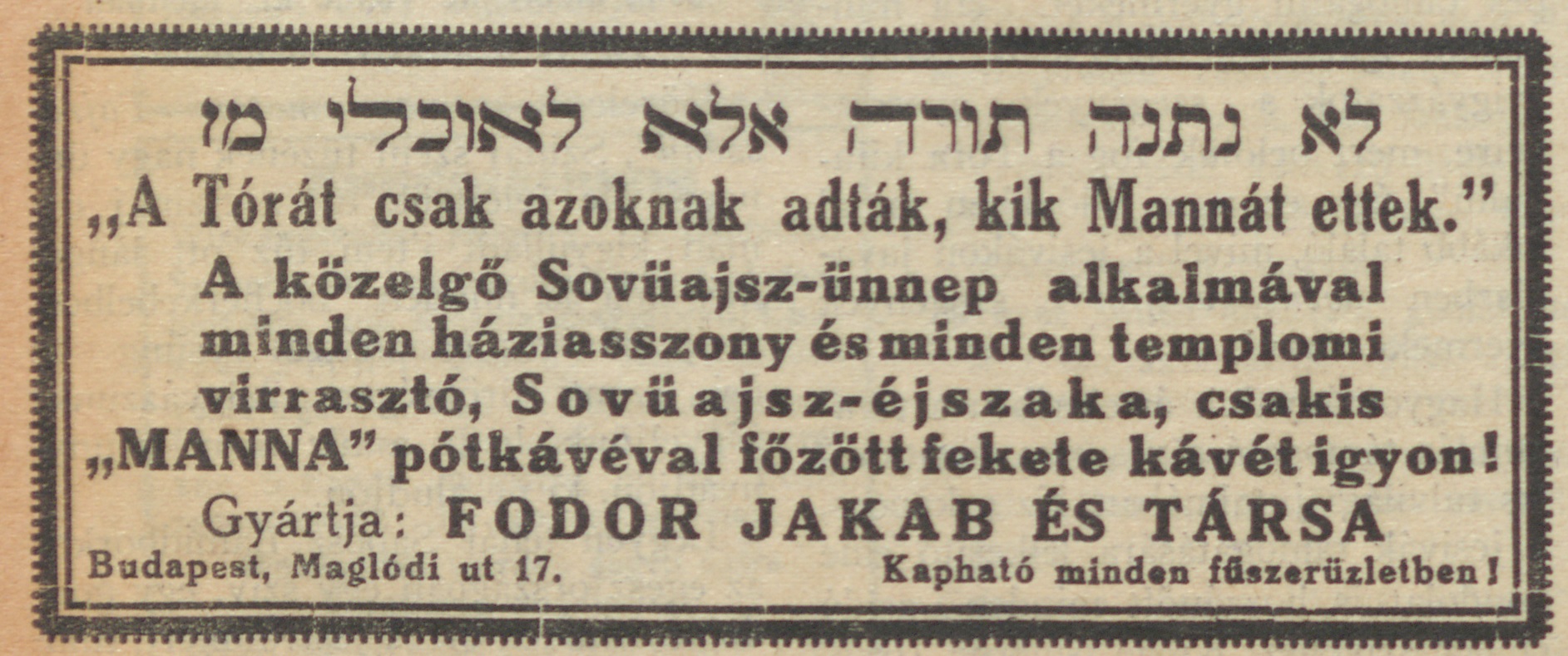Reklám, fogyasztás és szimbolikus politika
A szimbolikus politikának, a modern nemzeti kultuszoknak egyes jelképei a gazdaság és a fogyasztás terén ösztönző, egyesítő és meghatározó szimbólumok lettek. Ilyen volt a 19. század utolsó harmadától magyar őstörténet mitikus madara, a Turul is. Viselte a nevét gyertya, jelent meg borkereskedők számolócéduláin, 1927-ben a szombattartóm Heschkovits Lajos üveges és képkeretező is ezzel a cégnévvel hirdette magát Pesten az Akácfa utcában. A Turul orthodox kontextusban ritkán az első világháborús halottakra való lokális megemlékezések részeként tűnt még fel. Skerek Lipót 1938-ban a Szent István hét eseménysorozatát ítélte reklám erejűnek. Szent István alakja a két világháború közötti magyar törekvések szimbolikus politikai jelképe volt. Az évfordulóról államilag elvárt eseményként a jeruzsálemi magyar kajlelban is megemlékeztek.
Az orthodox hirdetések másik csoportja a vallási hagyományból merített. A Manna pótkávé reklámja Rabbi Simon bár Joháj szavait idézte meg: “A Tórát csak azoknak adták, akik mannát ettek.” (Pesziktá Básáláh) A szóbeli tanban való jártasság ráutalás lehetett a forgalmazott árú valóban orthodox kóser voltára is. „MICHJO” márkanév Weisz Mór orthodox kóser keksz-, kétszersült és teasüteményeinél a rá mondandó áldás szövegére utalt.
Advertising, consumption and symbolic politics
Some symbols of symbolic politics, of modern national cults, have become symbols that stimulate, unite and define the economy and consumption. Such was the case with the Turul, the mythical bird of Hungarian prehistory from the last third of the 19th century. The name was also used on candles, on wine merchants’ counting slips, and in 1927, the glass and picture framer Lajos Heschkovits, who was my Saturday keeper, advertised himself under this company name in Akácfa street in Pest. Turul still rarely appeared in an Orthodox context as part of local commemorations of the dead of the First World War. In 1938, Lipót Skerek considered the St. Stephen’s Week series of events to be an advertisement. The figure of St Stephen was a symbolic political symbol of Hungarian aspirations between the two world wars. The anniversary was also commemorated in the Hungarian kolel in Jerusalem as a state-mandated event.
Another group of Orthodox proclamations drew on religious tradition. The advertisement for the Manna replacement coffee quoted Rabbi Shimon Bar Yochay: “The Torah was given only to those who ate manna." (Pesikta Basalah) This proficiency in oral doctrine may have been an indication that the merchandise being marketed was indeed Orthodox kosher. The brand name “MICHJO" on Mór Weisz’s Orthodox kosher biscuits, biscuits and tea cakes referred to the text of the blessing to be recited on them.

Manna pótkávé reklámja Rabbi Simon bár Joháj szavaival a Zsidó Újságban. “A Tórát csak azoknak adták, akik mannát ettek.” (Pesziktá Básáláh)
Advertisement for Manna replacement coffee with the words of Rabbi Shimon Bar Yohai in the Zsidó Újság. “The Torah was given only to eaters of manna.” (Pesikta Basalach)
© OR-ZSE Könyvtára

A Szent István héttel hirdetett Skrek termékek reklámja 1938-as Zsidó Újságból
Advertisement for Skrek products during St Stephen’s Week from the Zsidó Újság of 1938
© OR-ZSE Könyvtára

Turul edényház reklámja a Szombat Almanachban, 1927
Advertisement of ”Turul” tableware store advertisement in the Szombat Almanach, 1927
© OR-ZSE Könyvtára